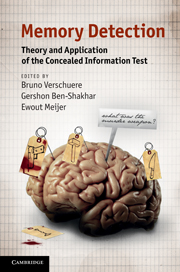Book contents
- Frontmatter
- Contents
- List of figures
- List of tables
- Notes on contributors
- Acknowledgments
- Part I Introduction
- Part II The laboratory: theoretical and empirical foundations of the Concealed Information Test
- Part III Field applications of concealed information detection: promises and perils
- Part IV Conclusions
- 16 Practical guidelines for developing a CIT
- Epilogue: current status and future developments in CIT research and practice
- Index
- References
Epilogue: current status and future developments in CIT research and practice
Published online by Cambridge University Press: 05 June 2012
- Frontmatter
- Contents
- List of figures
- List of tables
- Notes on contributors
- Acknowledgments
- Part I Introduction
- Part II The laboratory: theoretical and empirical foundations of the Concealed Information Test
- Part III Field applications of concealed information detection: promises and perils
- Part IV Conclusions
- 16 Practical guidelines for developing a CIT
- Epilogue: current status and future developments in CIT research and practice
- Index
- References
Summary
This volume, focusing on memory detection, provides a comprehensive and updated review of the Concealed Information Test (CIT) from almost all aspects: the measures used for detecting concealed knowledge (behavioral, autonomic, and brain-related measures); the underlying theories that may account for the effects observed in the CIT; its usage in forensic and clinical settings; its legal aspects and also the weaknesses of the test such as its vulnerability to countermeasures and to information leakage as well as its practical limitations. In this final chapter, we wish to briefly summarize the current status of the CIT and discuss several possible future developments.
Current status
Five decades of extensive research that has been conducted since the pioneering studies reported by David Lykken (1959, 1960) revealed that at least under controlled laboratory conditions, the CIT emerges as one of the most valid and accurate tools originating from psychology and behavioral sciences. For example, the meta-analytic study reported by Ben-Shakhar and Elaad (2003) showed that the average effect size (standardized mean difference between responses to concealed items of knowledgeable and unknowledgeable subjects) computed across all mock-crime experiments was 2.09, which is equivalent to a correlation coefficient of 0.65. Furthermore, when considering only mock-crime experiments that applied the CIT under optimal conditions (at least five CIT questions, motivational instructions, and a deceptive verbal response), the average effect size increased to 3.12, which is equivalent to a correlation coefficient of 0.79.
Information
- Type
- Chapter
- Information
- Memory DetectionTheory and Application of the Concealed Information Test, pp. 303 - 309Publisher: Cambridge University PressPrint publication year: 2011
